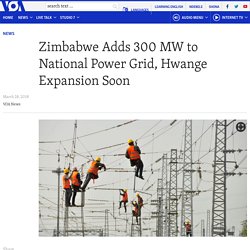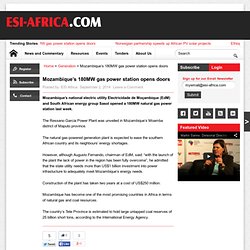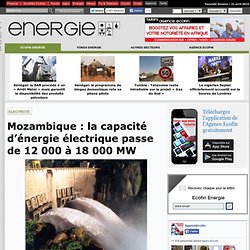

Zimbabwe Adds 300 MW to National Power Grid, Hwange Expansion Soon. KARIBA (Reuters) - Zimbabwe on Wednesday added 300 megawatts (MW) to its national power grid and President Emmerson Mnangagwa said work to expand the coal-fired Hwange plant by 600 MW would start soon now that financing had been secured from Chinese investors.

The southern African nation has struggled to produce enough electricity due to ageing equipment, with the most recent power plant having been built in 1987. It produces 1,200 MW against a demand of 1,600 MW. The balance is imported from Mozambique and South Africa. Mnangagwa commissioned two generators from China’s Sinohydro Corp that will produce 150 MW each at Kariba, the country’s largest hydro power plant 360 km north of the capital Harare. Sinohydro Corp will also carry out the Hwange expansion. “I am pleased to confirm that Hwange expansion project has reached financial closure and work should commence soon,” Mnangagwa said.
Economy/News/News/KBS World Radio. Mozambique’s 180MW gas power station opens doors. Mozambique’s national electric utility Electricidade de Moçambique (EdM) and South African energy group Sasol opened a 180MW natural gas power station last week.

The Ressano Garcia Power Plant was unveiled in Mozambique’s Moamba district of Maputo province. The natural gas-powered generation plant is expected to ease the southern African country and its neighbours’ energy shortages. Mozambique has potential to produce 18,000 megawatts of electric power. May 3rd, 2013 News Mozambique’s electric power production potential has risen from 12,000 to 18,000 megawatts in the wake of recent studies that include new and renewable energies, the energy minister has stated, reports the Maputo-based state daily Notícias.

Although Mozambique has conditions to produce energy to supply the domestic and regional markets, to do so requires the construction of production and transport infrastructures whose cost is beyond the financing capacity of the Mozambican state alone. The cost of the Centre/South electric power line between Tete and Maputo is estimated at US$2.5 billion and the Mpanda Nkua hydroelectric project at US$2 billion. The government therefore aims to seek partnerships with the private sector, said Minister Salvador Namburete. Because the problem is a financial one, the minister holds that a viable option is to develop projects that allow the risks associated to such investments to be shared. Related News: Mozambique : la capacité d’énergie électrique passe de 12 000 à 18 000 MW. (Agence Ecofin) - La capacité de production de l’énergie électrique du Mozambique est passée de 12 000 à 18 000 MW au terme de récentes études portant sur les énergies nouvelles et renouvelables, a relevé le ministre de l’énergie Salvador Namburete, lors d’une conférence sur « L’électrification de l’Afrique : cas du Mozambique », selon macauhub.com.

Selon M. Namburete, « le développement de ce potentiel qui est suffisant pour satisfaire les besoins domestiques mais le marché régional nécessiterait des partenariats public-privés surtout pour la construction des infrastructures de production et de transport ». Dans ce contexte, le gouvernement mozambicain entend élaborer un atlas sur les énergies renouvelables qui servira de banque de données sur les localités de bon potentiel pour le développement des énergies nouvelles et renouvelables de sorte à faciliter la définition des priorités et attirer les investissements vers ce secteur.
Sale of natural gas discovered in Mozambique begins. December 5th, 2012 News The groups and companies involved in the Area 1 oil concession, in Mozambique’s Rovuma basin, have started the process of selling the natural gas reserves they have discovered, according to Indian newspaper the Business Standard.

The newspaper, which cited sources from Bharat Petro Resources Limited (BPRL), a 100 percent subsidiary of the Bharat Petroleum Corporation, also said that the main potential buyers for the natural gas were Japan, South Korea, and Taiwan, as well as India. “The operator, US group Anadarko Petroleum, has set up sales teams who will seek to sell the natural gas in those markets, which can pay more for the product, at a time when the concession’s partners need to maximise revenues,” said a a company official. China State Grid Corp. plans to invest in Cesul project in Mozambique. July 27th, 2012 News China State Grid Corp plans to invest US$1.7 billion in the Centro-Sul (Cesul) project in Mozambique, which is intended to transport electricity produced at the Cahora Bassa hydroelectric facility to areas where it will be consumed, in the south of the country, Exame Moçambique magazine reported.

Following conclusion of feasibility studies funded by the European Investment Bank, the Mozambican government is now detailing the components of the future transmission network, which will be followed by making use of financing and launching concessions. Sources cited by the magazine said that Portuguese power grid company Redes Energéticas Nacionais (REN) taking a stake in the Cahora Bassa Hydroelectric Dam (HCB) was the short cut China State Grid Corp needed to become part of the project, which is one of two large investments in the electricity sector in Mozambique.
Fuel terminal due to be built at port of Beira in Mozambique. Rio Tinto Group seeks companies interested in building thermal power plant in Mozambique. June 19th, 2012 News The Rio Tinto group plans to start seeking out companies interested in building and operating power plants in order to develop its thermoelectric project at Benga, in Mozambique’s Tete province, said the chief executive of Rio Tinto Coal Mozambique.

The power plan, which will be installed next to the Benga coal mine in order to use coal produced there as fuel, will have an initial estimated capacity of 400 to 600 megawatts and is projected to provide electricity to Rio Tinto’s mining operation, as well as to the Mozambican and South African electricity grids. We believe that this project is a very attractive business opportunity and that has potential to attract a number of high quality partners,” said the chief executive of Rio Tinto Coal Mozambique, Eric Finlayson, cited by Mozambican daily newspaper Notícias.